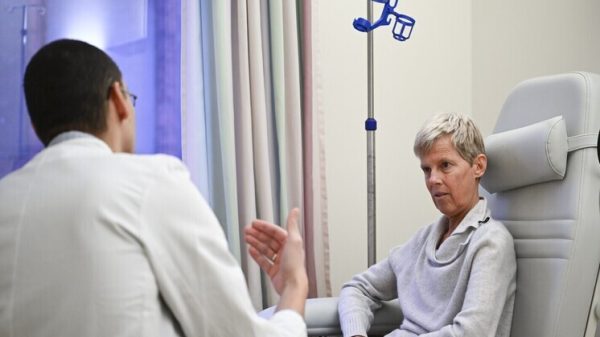
At the heart of Oxford’s effort to produce a Covid vaccine are half a dozen scientists who between them brought decades of experience to the challenge of designing, developing, manufacturing and trialling a safe vaccine at breakneck speed.
Prof Sarah Gilbert, the Kettering-born project leader, arrived at Oxford in 1994 to work with Prof Adrian Hill, a senior member of the team, on the malaria parasite, plasmodium. She soon fell into work on experimental vaccines, starting with one that roused white blood cells to fight malaria, followed by a “universal” flu vaccine.
As a student, Gilbert is said to have knitted cardigans with dogs on and played her saxophone in the woods to avoid disturbing her neighbours. As a researcher at Oxford she gained a no-nonsense reputation, which some attribute in part to her raising triplets, though her husband gave up work to parent them.
Oxford’s coronavirus work built on research pioneered by Hill and Gilbert on vaccines based on a virus that causes common colds in chimpanzees. The adenovirus could be rendered harmless and then modified to smuggle genetic material into human cells. The trick was to make that material the gene for a protein on the surface of a nasty virus, one the immune system could lock on to.
Hill, an Irish vaccinologist described by the Lancet as having a “silent steeliness”, was first into clinical trials with an Ebola vaccine based on the chimp virus during the 2014 outbreak in West Africa. He and Gilbert patented the technology and in 2016 co-founded Vaccitech, an Oxford spin-off, to capitalise on the research. The chimp cold virus, ChAdOx, became their weapon of choice against what the World Health Organization called “Disease X” – a hypothetical future pathogen with epidemic or pandemic potential.
vaccine uk
Before Sars-Cov-2, the virus behind Covid, came Mers-Cov, a related coronavirus that emerged nearly a decade ago in Saudi Arabia. It causes Middle East respiratory syndrome, or Mers, a more deadly but less transmissible disease than Covid. Building on Hill’s work, Gilbert and another team member, Teresa Lambe, developed an experimental vaccine against Mers-Cov. As that went into human trials in Saudi Arabia in December last year, Sars-Cov-2 had begun to stir.
The Oxford team went to work on the Covid vaccine on the morning of Saturday 11 January, just hours after scientists in China published the first genetic sequence of the virus. The vaccine was largely designed that weekend by Gilbert, Lambe and others. It wasn’t clear how fast the virus would spread, but Gilbert saw it as an opportunity to demonstrate rapid vaccine development against a new viral threat.

Within a few weeks, Oxford had usable vaccine for lab tests. Gilbert, who colleagues note can send emails from 4am until late at night, immediately gave some to Oxford’s manufacturing facility to churn out clinical grade shots for human trials. The Clinical Biomanufacturing facility, run by Catherine Green, was prepared for the task and quickly made the first batch of shots for phase 1 safety trials.
Next to step up was Sandy Douglas, who joined Oxford as a medical student in 2004 and worked on vaccines since 2007. He had been telling people for some time that the outbreak could be as bad as the 1918 flu and felt some in the scientific community had under-reacted to events in China. His team devised a way to make the vaccine at industrial scale and set up a consortium of manufacturers to produce it in the UK, the Netherlands, India and China. By March, facilities were gearing up to make tens of millions of doses before anyone knew whether the vaccine worked.
By the beginning of April, Oxford had enough vaccine to launch clinical trials. Andrew Pollard, head of the Oxford vaccine group, who has spent 20 years running clinical trials, prepared and oversaw them. His team worked with doctors at 19 trial sites around the UK and six each in Brazil and South Africa to get the trials done. That month, the first shots went into volunteers.
Today, seven months later, the scientists can say that it works.






















































Свежие комментарии